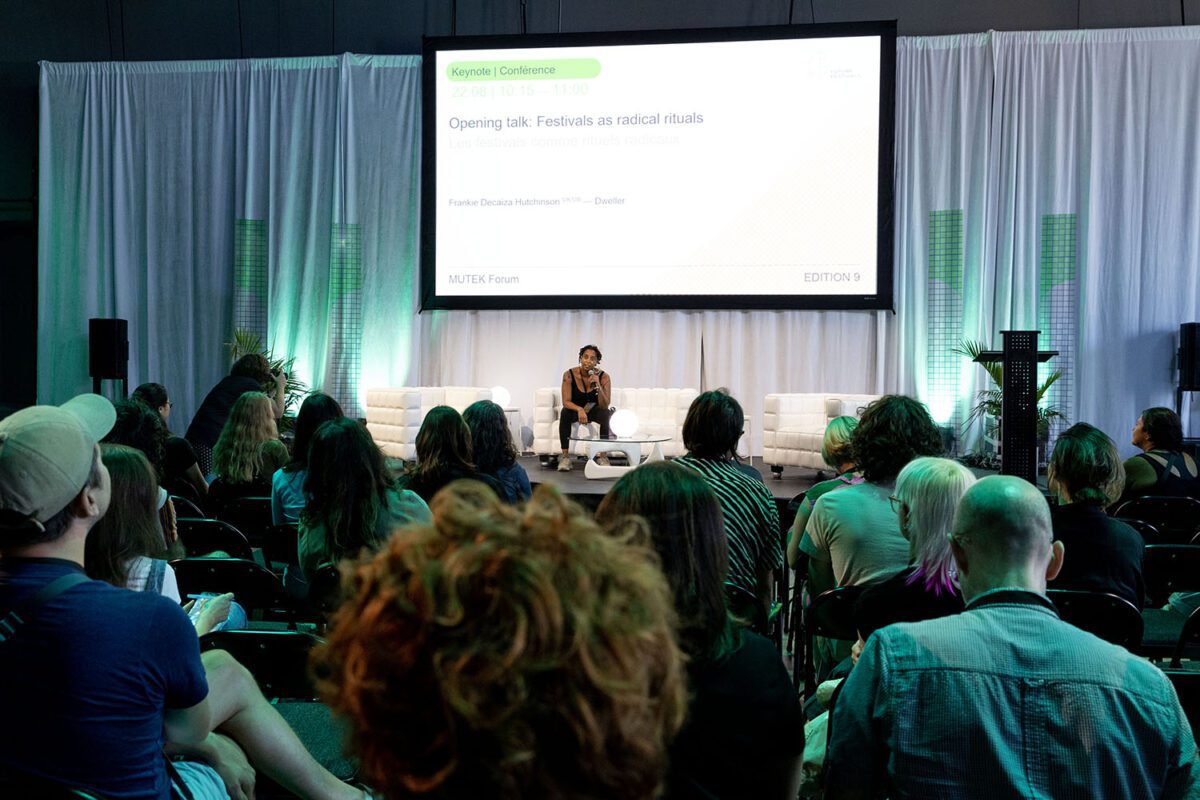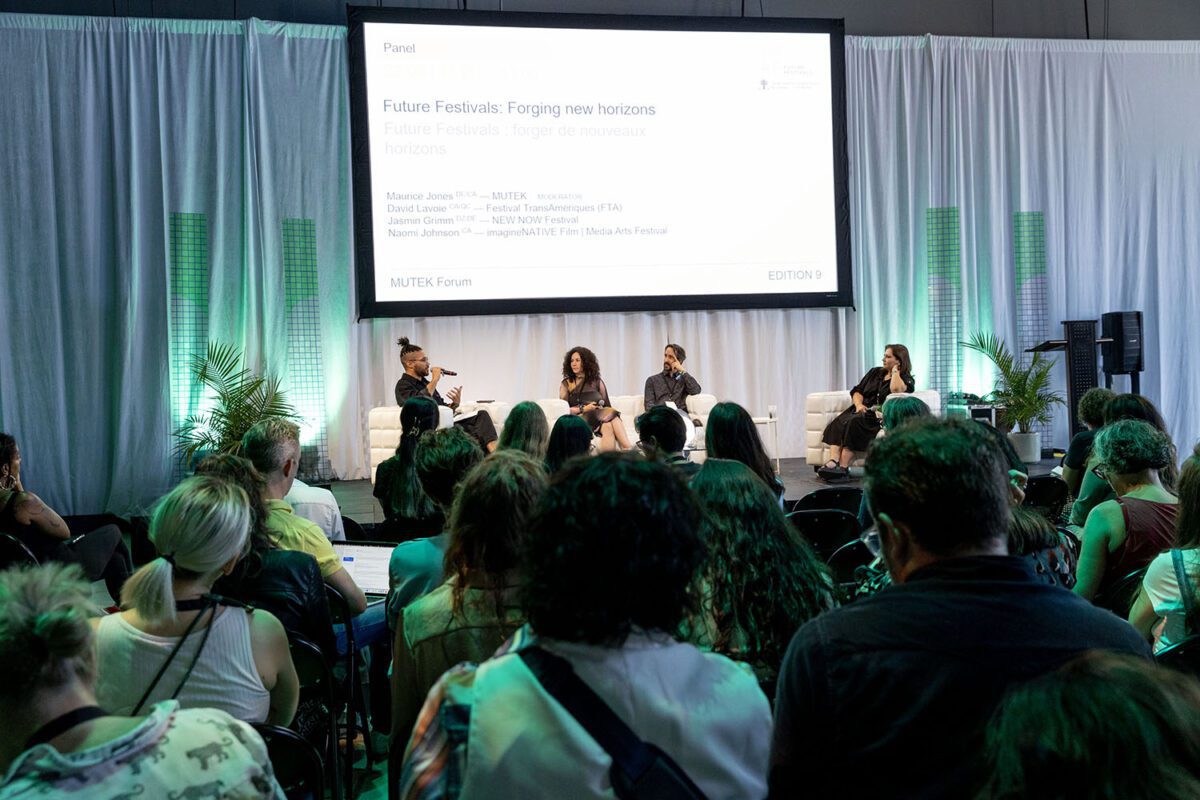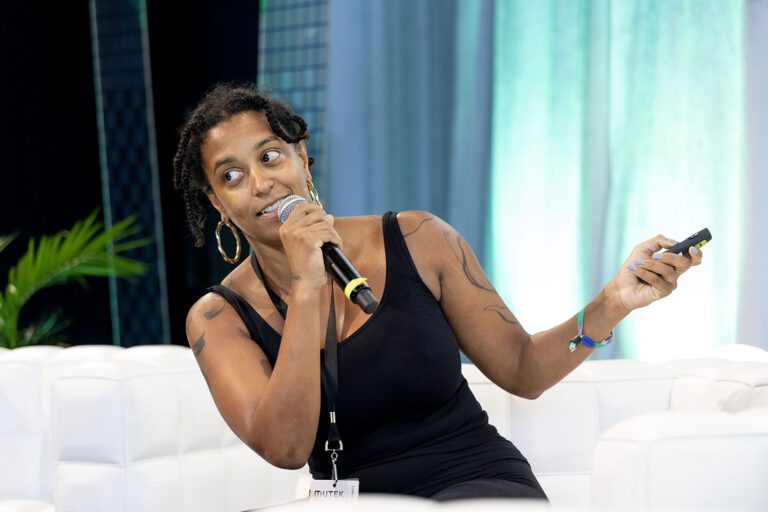At its inception, the MUTEK Forum was held 6 months before the festival. In 2018, the two events have been grafted together, offering a unique perspective on digital creativity. Programmed by Sarah Mackenzie and hosted by Claudine Hubert, the 9th edition is entitled “Future currents” and will be held all week long at Les 7 doigts de la main. MUTEK offers us the chance to delve into a wide range of contemporary themes: the relationship between culture, technology and the climate crisis; accessibility and inclusion within immersive technologies; the power of tech; art, governance and artificial intelligence; and the future of festivals. PAN M 360 reports on the first day.
Photo credits : Maryse Boyce
Opening talk – Festivals as radical rituals

Frankie Decaiza Hutchinson – founder of Dweller and cofounder of Discwoman
As programmer of the Bossa Nova Civic Club in Brooklyn, Frankie Hutchinson had a front-row seat to observe the impact of the electronic music industry on the expression of black artists and people, i.e. a lack of space and visibility. It particularly struck her when an artist approached her to organize a special event for Black History Month. Why limit yourself to one event, one week, one month? So naturally, she ended up taking the lead and creating a space for electronic talent from black communities to express themselves, in the form of Dweller, a DIY festival, launched in 2018.
Quickly becoming a “ritual” offering the necessary space for a form of individual and collective catharsis, Dweller has grown to the point of going international with an event at the famous Berghain (Berlin) and programming headliners such as Jeff Mills. With this expansion comes questions: how do you grow without sacrificing the intimacy of your events? How can we develop our audience without losing our curatorial perspective? And, of course, how to ensure its sustainability and financing? At Dweller, financing is largely based on merchandising, and the community can meet and connect in other ways on a blog, Dweller Electronic, which has a political dimension. These are all interesting reflections for thinking about the development of independent events, imagining the future of festivals and their community roots.s, qui comporte une dimension politique.
Panel – Future Festivals : Forging new horizons

Maurice Jones, moderator; Jasmin Grimm, NEW NOW Festival ; David Lavoie, FTA; Naomi Johnson, imagineNATIVE Film | Media Arts Festival
Introduced by Maurice Jones of Future Festivals Lab, the aim of the discussion was to question the power of festivals. The discussion began with a round table on the challenges faced by festivals during the pandemic and the post-pandemic period.
David Lavoie of Festival TransAmériques was one of the 16 initiators of the open letter “Attention, festivals fragilisés” published in February 2023 in Le Devoir. The signatories joined forces to highlight their fragility and the issues they share, mainly the mental health of employees, the maintenance of events and their terms and conditions. The coverage of this letter enabled them to make their voices heard and initiate discussions with the government.t.
For Naomi Johnson, the priority was to pay the artists, which led to an evolution in the festival’s mission to become a content producer. In addition, experimentation with video-on-demand has enabled them to develop their audience. Naomi Johnson also laments the loss of institutional knowledge when there is a departure in the team, which makes the task of getting back to “where we were before” all the more difficult.
As for the NEW NOW Festival, the change was quite radical, as the annual event became biennial, the only way for Jasmin Grimm and her team to stay healthy. Like other festivals, they’ve had to contend with inflation, worker shortages and, above all, the climate issue. NEW NOW is held on the site of Europe’s largest former coal mine, Zollverein, in Essen (Germany). This historic site has been a UNESCO World Heritage Site since 2001. The site’s past and present use inevitably makes us reflect on the climatic consequences of yesterday’s industrial activities and today’s events. For this reason, the festival has taken up the theme of climate change and offered workshops on self-sufficiency to festival organizers.
A younger festival like NEW NOW has to deal with the bureaucratic issues associated with its heritage site. However, as with its counterparts, successfully bridging the needs of artists and communities is a challenge.
What about the death of festivals? As David Lavoie points out, institutions sometimes have to die, and we need to be able to address this issue if we are to foresee the future of festivals. That’s why the NEW NOW Festival has given itself a 10-year lifespan.
We’ll leave you to ponder.
























